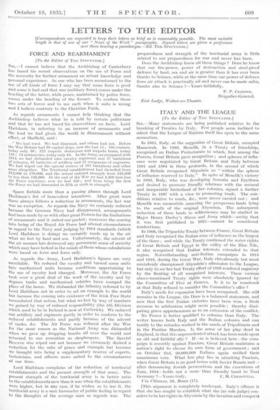LETTERS TO THE EDITOR
[Correspondents are requested to keep their Fellers as brief as is reasonably possible. The most suitable length is that of one of our " Ne7114 of the Week " paragraphs. Signed letters are given a preference over those bearing a pseudonym.—Ed. Tux SeeeraToa.] FORCE AND REARMAMENT [To the Editor of THE SPECTATOR.] SIR,—I cannot believe that the Archbishop of Canterbury has based his recent observations on the use of Force and the necessity for further armament on actual knowledge and personal experience. As one who has been accustomed to the Ilse of all kinds of force I may say that some force is good
and some is bad and that war (military force) conies under the heading of the latter, while peace, maintained by police force, conies under the heading of the former. To confuse these two sets of forces and to use each when it suits is wrong and I believe contrary to the Christian Faith.
As regards armaments I cannot help thinking that the Atrehbishop believes what he is told by certain politicians and that he has not based his observations on facts. Lord Ilaiisham, in referring to an increase of armaments and
the lead we had given the world in disarmament without effect, at Sheffield, said : " We had tried. We had disarmed, and others had not. Before the War Britain had 69 capital ships, now she had 15 ; 105 cruisers, today only 50 ; 322 torpedo destroyers and torpedo boats, today 118 ; 74 submarines, today only 48. In the Army, as compared with 1914, we had disbanded nine cavalry regiments and 27 battalions Of infantry, 61 batteries of artillery and 21 companies of engineers. We had wiped out the special reserve of 101 battalions and other arms altogether. The Territorial establishment had dwindled from 313,000 to 170,000, and the actual enlisted strength froth 249,000 t4 less than 130,000. At the and of the War we had 3,300 first-line Air Force machines, now we had 850 ; and from being the first Air Force we had descended to fifth or sixth in strength."
• Space forbids more than a passing glance through Lord
riailsham's list of benevolent intentions. After great wars there always follows a reduction in armaments, the last war Was no exception. As regards the Navy we certainly reduced . because the German Navy had disappeared, arrangements had been made by us with other great Powers for the limitations
of armaments and it suited our pocket; moreover the coming into being of the Royal Air Force had altered circumstances in regard to the Navy and judging by 1914 standards (which Lord Hailsham is doing) we certainly made up, in the air *hat we lost by land and sea. Unfortunately, the advent of the air menace has destroyed any permanent sense of security Which may have lurked in the minds of those whose calculations Were based on force and force only.
As regards the Army, Lord Hailsham's figures are very unreliable. We reduced the cavalry and turned some units Into mechanised units because conditions appertaining to the use of cavalry had changed. Moreover, the Air Force
took over a great deal of the work of the cavalry and by degrees tanks and mechanised vehicles have usurped the Place of the horse. We disbanded the infantry referred to by Lord Hailsham not in order to set an example to the world but because the coming into existence of the Irish Free State necessitated that action, but what we lost by way of numbers We gained by way of reduced responsibility (the 5th Division which used to be in Ireland is now at Catteriek), We reduced our artillery and engineers partly in order to conform to the reduced establishments and partly because of the advent of tanks, &e. The Air Force was reduced after the War for the same reason as the National Artily was disbanded
When we gave up dropping bombs all over the world and returned to our• avocation as shopkeepers. The Special Reserve Was wiped out not because we virtuously desired a reduction for the sake of peace and example but because We brought into being a supplementary reserve of experts, technicians, and officers more suited to the circumstances of our time.
Lord Hailsham complains of the reduction of territorial establishments and the present strength of that army. The present strength of the territorial army is in better ratio to the establishments now than it was when the establishments
Were higher, but in any case, if he wishes so to use it, the territorial army is a sure barometer of public feeling in regard
to the thoughts of the average man as regards war. The
preparedness and strength of the territorial army is little related to our preparedness for war and never has been.
Does the Archbishop know all these things ? Does he know. that our fire-power, power of destruction and steel-proof defence by land, sea and air is greater than it has ever been thanks to Science, while at the same time our power of defence from air attack is practically nil and never can be made safer, thanks also to Science F—Yours faithfully, East Lodge, Walton-on-Thames. F. P. CROZIER, Brigadier-General.


























































 Previous page
Previous page